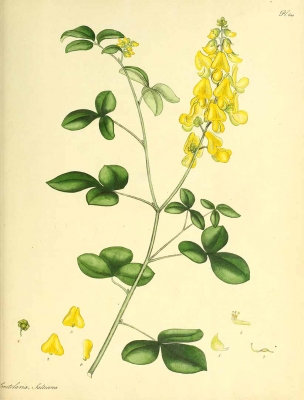Crotalaria saltiana
Andrews
Fabaceae
Crotalaria farcta R.Br. ex Baker f.
Crotalaria lupinoides Hochst. ex Benth.
Common Name:
General Information
Crotalaria saltiana is a bushy white-hairy short-lived perennial herb growing 30 - 70 cm tall, sometimes with spreading procumbent branches from near the base[
328- Title
- African Flowering Plants Database
- Publication
-
- Author
-
- Website
- http://www.ville-ge.ch/musinfo/bd/cjb/africa/recherche.php
- Publisher
- Conservatoire et Jardin Botaniques.
- Year
- 0
- ISBN
-
- Description
- Contains information on over 150,000 plant names (including synonyms) giving a description and habitat, plus a distribution map.
].
The plant is sometimes gathered from the wild for the fibre in its stems, which is used locally,
Known Hazards
No specific mention of toxicity has been seen for this species, but many members of this genus are known to contain pyrrolizidine alkaloids, the most potent of which in this genus are monocrotaline, retrorsine and retronecine[
1309- Title
- The Leguminosae; A Source Book of Characteristics, Uses and Nodulation
- Publication
-
- Author
- Allen O.N.; Allen E.K.
- Publisher
- University of Wisconsin
- Year
- 1981
- ISBN
- 0-333-32221-5
- Description
- An amazing and comprehensive work, giving a brief guide to the many genera of the family Fabaceae and also the principle uses of the genus.
]. These alkaloids have a cumulative effect upon the body and, unless concentrations in a plant are high, occasional consumption is generally completely safe. Pyrrolizidine alkaloids are derived from amino acids including ornithine. Many of these alkaloids have pronounced hepatic toxicity, but the lungs and other organs may be affected as well. Mutagenic and carcinogenic activities of pyrrolizidine alkaloids have also been reported[
299- Title
- Protabase - Plant Resources of Tropical Africa.
- Publication
-
- Author
-
- Website
- http://www.prota.org
- Publisher
-
- Year
- 0
- ISBN
-
- Description
- An excellent on-line database with detailed information on over 3,200 species of useful plants of Africa.
].
Botanical References
Range
Eastern tropical Africa - Tanzania north to Ethiopia.
Habitat
Deciduous bushland, semi-desert scrub, in sandy and rocky places; often where extra water collects, e.g. sandy wadis, tugs, alluvial flats; in maritime sandy situations and in secondary thickets from sea level to elevations of 1,300 metres[
328- Title
- African Flowering Plants Database
- Publication
-
- Author
-
- Website
- http://www.ville-ge.ch/musinfo/bd/cjb/africa/recherche.php
- Publisher
- Conservatoire et Jardin Botaniques.
- Year
- 0
- ISBN
-
- Description
- Contains information on over 150,000 plant names (including synonyms) giving a description and habitat, plus a distribution map.
].
Properties
| Other Uses Rating |      |
| Habit | Perennial |
| Height | 0.50 m |
| Cultivation Status | Wild |
Cultivation Details
A plant of lowland tropical regions, growing in areas where there is a distinct dry season.
Plants in this genus generally prefer a sunny position, succeeding in dry to moist, well-drained soils[
200- Title
- The New RHS Dictionary of Gardening. 1992.
- Publication
-
- Author
- Huxley. A.
- Publisher
- MacMillan Press
- Year
- 1992
- ISBN
- 0-333-47494-5
- Description
- Excellent and very comprehensive, though it contains a number of silly mistakes. Readable yet also very detailed.
].
This species has a symbiotic relationship with certain soil bacteria; these bacteria form nodules on the roots and fix atmospheric nitrogen. Some of this nitrogen is utilized by the growing plant but some can also be used by other plants growing nearby[
755- Title
- Nodulation Plants in GRIN Taxonomy
- Publication
-
- Author
-
- Website
- http://www.ars-grin.gov/~sbmljw/cgi-bin/taxnodul.pl?language=en
- Publisher
- United States Department of Agriculture
- Year
- 0
- ISBN
-
- Description
- An online database listing plants that have either positive or negative reports on root and stem nodulation with nitrogen-fixing bacteria.
].
Edible Uses
None known
Medicinal
None known
Other Uses
A strong fibre obtained from the bark and stems is used to make nets[
46- Title
- Dictionary of Economic Plants.
- Publication
-
- Author
- Uphof. J. C. Th.
- Publisher
- Weinheim
- Year
- 1959
- ISBN
- -
- Description
- An excellent and very comprehensive guide but it only gives very short descriptions of the uses without any details of how to utilize the plants. Not for the casual reader.
,
1309- Title
- The Leguminosae; A Source Book of Characteristics, Uses and Nodulation
- Publication
-
- Author
- Allen O.N.; Allen E.K.
- Publisher
- University of Wisconsin
- Year
- 1981
- ISBN
- 0-333-32221-5
- Description
- An amazing and comprehensive work, giving a brief guide to the many genera of the family Fabaceae and also the principle uses of the genus.
].
Propagation
Seed - pre-soaking the seed for 12 hours in warm water can help to reduce germination time. If you have sufficient seed then it can be sown in situ. Otherwise sow in trays in a nursey and, when the seedlings are large enough to handle, pot them up into individual pots. Plant out when 15cm or more tall.
If you have any useful information about this plant, please leave a comment. Comments have to be approved before they are shown here.


 Useful Tropical Plants Database 2014 by
Ken Fern,
web interface by
Ajna Fern
with help from
Richard Morris.
Useful Tropical Plants Database 2014 by
Ken Fern,
web interface by
Ajna Fern
with help from
Richard Morris.